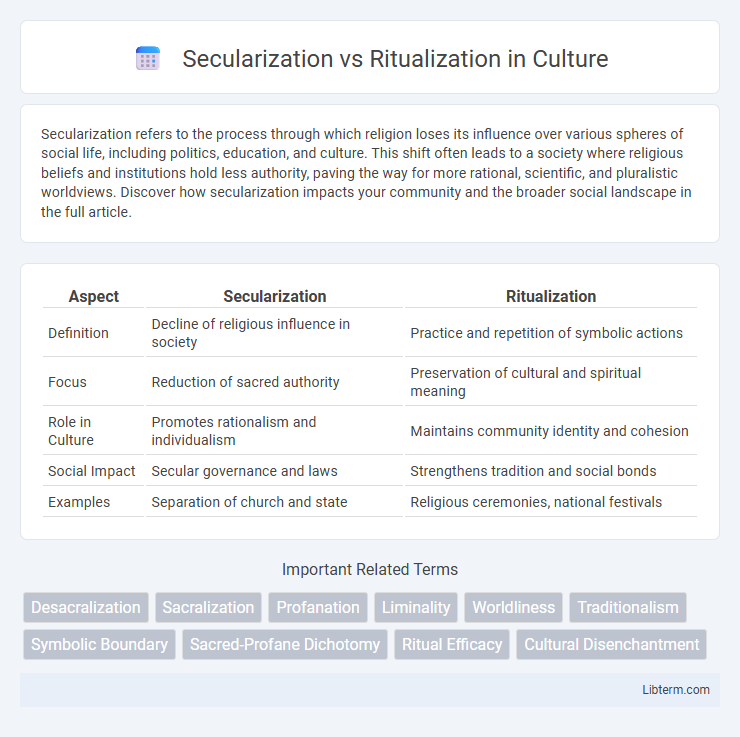Secularization refers to the process through which religion loses its influence over various spheres of social life, including politics, education, and culture. This shift often leads to a society where religious beliefs and institutions hold less authority, paving the way for more rational, scientific, and pluralistic worldviews. Discover how secularization impacts your community and the broader social landscape in the full article.
Table of Comparison
| Aspect | Secularization | Ritualization |
|---|---|---|
| Definition | Decline of religious influence in society | Practice and repetition of symbolic actions |
| Focus | Reduction of sacred authority | Preservation of cultural and spiritual meaning |
| Role in Culture | Promotes rationalism and individualism | Maintains community identity and cohesion |
| Social Impact | Secular governance and laws | Strengthens tradition and social bonds |
| Examples | Separation of church and state | Religious ceremonies, national festivals |
Defining Secularization and Ritualization
Secularization refers to the process by which religious influence diminishes in social, cultural, and political spheres, leading to a more secular society where religion plays a less central role. Ritualization, in contrast, involves the increased emphasis on rituals and symbolic practices that may retain religious elements or adopt secular meanings, reinforcing group identity and social cohesion. Understanding secularization and ritualization highlights the shifting dynamics between declining institutional religion and evolving cultural practices.
Historical Contexts of Secularization
Secularization historically emerged during the Enlightenment as societies shifted from religious authority to rational, scientific governance, reducing the church's influence over politics and education. The decline of feudalism and the rise of capitalist economies further propelled secular norms by prioritizing individual rights and empirical knowledge over religious dogma. This transformation was marked by the separation of church and state, fostering a cultural move toward secular institutions and public spheres.
Ritualization Across Cultures and Religions
Ritualization manifests uniquely across cultures and religions, serving as a fundamental mechanism for expressing collective identity and spiritual beliefs through symbolic actions and ceremonies. In diverse traditions--from Hindu pujas and Islamic prayer rituals to Christian sacraments and indigenous rites--rituals reinforce community cohesion and transmit cultural values. Anthropological studies highlight that ritualization often preserves social order and continuity by embodying shared myths, ethical codes, and ancestral heritage.
Drivers of Secularization in Modern Societies
The primary drivers of secularization in modern societies include scientific advancements, increased education levels, and urbanization, which collectively promote rational thinking over religious dogma. Modernization leads to the differentiation of societal institutions, reducing the influence of religion in public and political spheres. Furthermore, the rise of individualism encourages personal autonomy in belief systems, diminishing the role of traditional religious authorities.
Functions and Meanings of Rituals
Rituals serve crucial social functions by reinforcing group cohesion, creating a shared sense of identity, and facilitating emotional expression, which secularization often challenges by shifting focus toward individualism and rationality. While secularization tends to reduce the religious or metaphysical meanings traditionally embedded in rituals, ritualization preserves their symbolic significance, embedding cultural values and social norms in daily practices. The dynamic interplay between secularization and ritualization highlights how rituals adapt to maintain their role in structuring community life and meaning-making, even in increasingly secular contexts.
Secularization’s Impact on Traditional Rituals
Secularization reduces the social significance of traditional rituals by shifting focus from sacred to secular values, leading to a decline in participation and altered meanings. This transformation affects rituals' roles in community cohesion, as religious ceremonies are often replaced by secular events that emphasize individualism over collective identity. The impact of secularization on rituals also results in adaptive modifications, where some traditions are maintained symbolically but lose their original spiritual context.
Ritualization in Secular Contexts
Ritualization in secular contexts transforms everyday actions into meaningful practices that foster social cohesion and personal identity without religious underpinnings. These secular rituals, such as graduation ceremonies or national holidays, create shared experiences that reinforce community values and collective memory. This phenomenon highlights how ritual elements persist and adapt, maintaining significance even as societies move away from traditional religious frameworks.
Intersection of Secular and Sacred Practices
The intersection of secular and sacred practices reveals a complex dynamic where secularization transforms traditional religious rituals into culturally symbolic ceremonies, often detached from their original spiritual meanings. Ritualization persists in secular contexts through activities like national holidays, public commemorations, and social ceremonies that mimic religious structures to foster community identity and social cohesion. This blend underscores how modern societies negotiate sacred and secular boundaries, reflecting evolving cultural values and collective memory.
Global Trends: Secularization vs Ritualization
Global trends reveal a complex interplay between secularization and ritualization, with secularization marked by declining religious affiliation and institutional influence in many Western nations, while ritualization persists as a means of cultural identity and social cohesion. In regions like Africa and parts of Asia, ritualization often strengthens despite modernization, reflecting local traditions and community bonds. Data from Pew Research Center highlights increasing secular populations in Europe contrasted with flourishing ritual practices globally, underscoring diverse trajectories in religiosity and socio-cultural behaviors.
Future Trajectories: Blending or Divergence?
Future trajectories of secularization and ritualization reveal complex interactions where secular frameworks may integrate ritualistic elements to maintain social cohesion and identity. Digital technology facilitates novel ritual expressions within secular contexts, suggesting a blending rather than strict divergence. Sociological trends indicate evolving practices that challenge binary distinctions, emphasizing hybrid forms shaping cultural and religious landscapes.
Secularization Infographic

 libterm.com
libterm.com